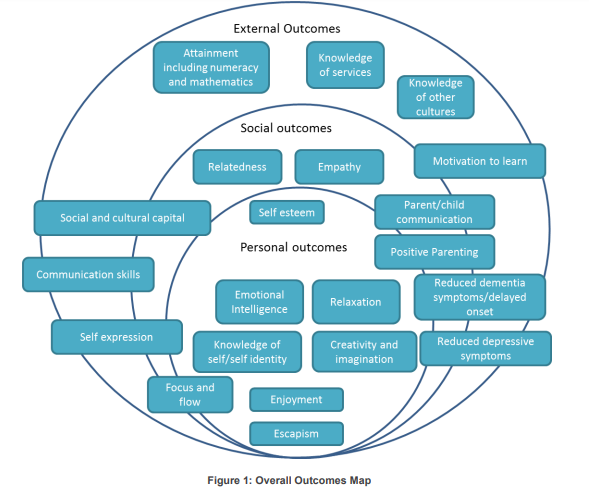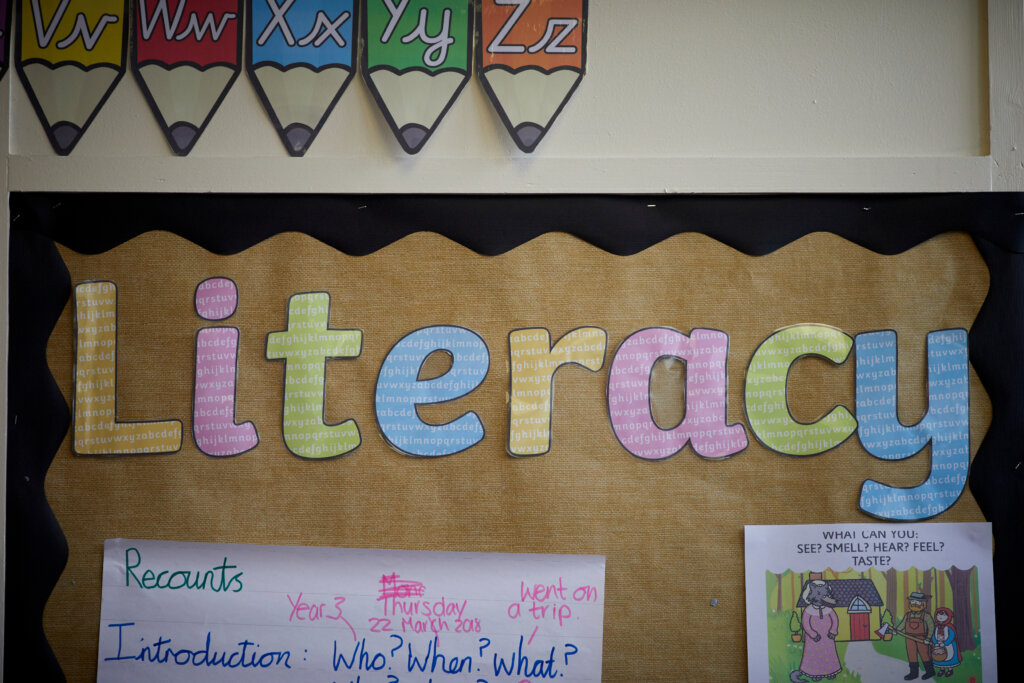Reading is crucial. Every child and young person must leave school able to read proficiently, for both pleasure and purpose. However, we have a long way to go for this to happen. PISA (2015) showed that approximately 18% of children in England leave secondary education without baseline proficiency in Reading. That means that almost 1 in 5 children leave school without the minimum level of Literacy to “…enable them to participate effectively and productively in life.” James and Dianne Murphy discuss this in detail in their book Thinking Reading: What Every Secondary Teacher Needs to Know About Reading (2018). Although the book is aimed at secondary staff, the statistics are food for thought for any educator, in EYFS, primary, secondary or further education settings. They state that poor reading at school is linked to low self-esteem, poor mental health, more aggressive behaviour, disruption in school and much poorer academic outcomes. In later life, the negative impact of poor reading becomes ever more pervasive. The National Literacy Trust estimates that around 7.1 million adults have ‘very poor’ literacy skills in the UK. If you are functionally illiterate, you are more likely to have lower earnings, poorer health and housing, lower life expectancy and a much higher rate of incarceration, with around 70% of prisoners in the UK having literacy difficulties. Aside from the negative impacts of not being able to read fluently, there are myriad positive impacts to being able to read and enjoy reading too.
The positive impact of being a good reader is well known. Not only does it impact attainment but also mental health, employment, empowerment and much more. The Reading Agency commissioned a Literacy Review that explored the links between reading for pleasure and empowerment. Reading for pleasure was found to have a positive impact on all of the aspects in the graphic below:

Outcomes of Reading for Pleasure, The Reading Agency (2015)
So, what can we do to ensure all children become proficient, confident readers? Much of the current discourse around reading is focused on the EYFS and Primary phases. The early steps of learning to read and decode are of course, crucial, as are the beginnings of building understanding and the cultivation of reading enjoyment, but none of this ends on the last day of Year 6. In order to become really fluent readers, students have to continue to build fluency, make meaning and strengthen their enjoyment of reading throughout their time at Secondary school. So, how can we continue students’ reading journeys successfully, and support all students to become fully fluent readers?
Building a Reading Culture
We know that reading is important – not just from an academic standpoint but also in many other ways. Rather than accepting this fact quietly, we need to shout it from the rooftops! Think about your school right now – does it shout that reading is important? Would your students, staff, parents and community know it is important to you? If you’re having to think about it, the answer may be that while it might be important to you, it isn’t necessarily as visible as you need it to be. Just a few things to consider might be:
- Role models – Do the students see staff reading? Are references made to books, texts and reading throughout the school day? Is your headteacher also your ‘head reader’? Have you set up a whole school recommendations strategy? Do students read with other students?
- Time – How much time is devoted to reading? What about the split between reading for purpose and specifically just reading for pleasure? How often do staff read aloud to students for pleasure?
- Spaces and places – Where does reading happen? Is it encouraged at lunchtimes and breaktimes? Are books used in assemblies and other communal events? How well is the library utilised? Are displays about reading changed regularly?
- Celebrations and activities – How is reading celebrated? Do students go on visits linked to reading? Are authors, poets, illustrators and playwrights invited into school?
Building a reading culture is the first step in getting all students to become great readers, because the key is getting everybody reading. If you can do that, just by promoting reading, you’re halfway there.
Reading Right Across the Curriculum
Too often, reading is boxed off into English, but reading is pervasive across life and so it needs to pervade our curriculum too. Having a reading strategy for the whole school is crucial, so that reading is seen as everybody’s job to promote, not just the English department’s. The EEF’s Guidance Report Improving Literacy in Secondary Schools gives some key pointers when considering how to prioritise disciplinary literacy by:
- Auditing existing literacy practices, attitudes, and resources in school
- Creating subject specific literacy plans, rooted in the discipline, that address barriers to accessing the curriculum related to reading;
- Supporting teachers to define effective reading in their subjects; for example, history teachers might discuss what reading strategies are deployed by historians to appraise historical sources;
- Evaluating the quality and complexity of existing reading materials in school, assessing the degree of academic challenge such texts pose to our secondary school students as they progress through school; relating this to baseline data of students’ reading ability, and;
- Ensuring that the development of disciplinary literacy is coherently aligned with curriculum development.
You could consider appointing a reading champion for each subject, who can guide and implement key reading strategies that are appropriate to that specific subject, liaising with the Reading Lead and subject teams to get the most out of reading. By planning in reading opportunities into every subject, and indeed every lesson, we can give students the chance to practise and gain confidence in reading for meaning, as well as gain new vocabulary, knowledge and skills to support the subject they are engaging in.
Teaching the Thinking Behind Reading
The thinking behind reading also needs careful consideration, particularly when students are engaging in academic reading. Reading strategies and skills need to be explicitly taught and modelled, with students given the chance to practice and apply those skills in different subjects. They need to become strategic, active readers, using these skills to comprehend and make meaning from any text they read, whether that is for pleasure or a particular purpose. This is a natural progression from KS1 and KS2 where many schools engage in strategy and skill-specific teaching in Reading such as through the use of the One Education Reading Gems approach.
When students learn these specific skills and strategies, it is important that they develop an understanding of how to apply these skills to each subject, and the nuances that requires. This is why it is crucial for subjects to develop their own subject concept of reading and be explicit in how that strategy applies in their context.
Consider how reading strategies and skills are taught in your setting currently. Are they taught explicitly and modelled by staff? Are students given the chance to practise and apply these skills in different contexts using different texts? Are strategies explored in different subjects and the nuances of applying the strategies unpicked with students?
Not Forgetting About Fluency
In most secondary schools, over a quarter of new Year 7s will arrive not having reached the expected standard in Year 6 Reading. Whilst this does not automatically mean they aren’t fluent readers, it does point to those students needing support to continue to build their fluency further. Indeed, some may still struggle to decode, and be in need of a clear Phonics intervention. The Department for Education’s Reading Framework is clear that older students learning to read and needing support to decode must be taught Phonics and access phonically decodable books appropriate to their age and phonics knowledge. This is in addition to listening to and engaging with the texts that their peers are reading. For students whose fluency or comprehension need support, they will require specific intervention to catch up with their peers too. For those students who are finding fluency challenging, considering a specific fluency-focused intervention is key, such as those constructed by Tim Rasinski in The Megabook of Fluency.
However, it’s also important not to rest on our laurels with reading fluency more generally. As texts and concepts become harder, there is a risk that some students, who were previously not at risk, will fall behind because of their fluency. Planning in regular opportunities to read, in all subjects, is crucial, perhaps building in chances to engage in modelled reading, echo reading and choral reading to provide further practice. Fluency can often be forgotten once students can decode, but we have to continue to support it, if we want all students to engage fully with reading.
Consider fluency in your setting – is it prioritised? Would staff feel confident modelling fluency and explicitly teaching fluency through echo and choral reading? Do students who need support for fluency get it?
The One Education Reading Award for Secondary Schools
Having a strong and purposeful Reading curriculum is crucial to education at secondary level. By developing students reading, both for purpose and pleasure, we can give them the very best chance to succeed, both at school and beyond. Following the success of our Reading Award with primary schools, SEND schools and Alternative Provision settings, we have now developed our Secondary Reading Award.
The One Education Secondary Reading Award is a Reading quality standard for secondary schools and settings. It is the only Reading quality mark which focuses on the full Reading curriculum offered by schools. Whether you want to improve your Reading offer or celebrate your achievements, the One Education Reading Award offers a straightforward process designed to support your individual needs.
At the heart of the Secondary Reading Award is our criteria document which guides schools to develop their Reading provision. Our approach is split into three areas: Reading for Fluency; Reading for Meaning and Reading for Enjoyment. These three elements of Reading are broken down into key objectives, making next steps clear to schools completing the award.
For more information on the One Education Reading Award, please visit the Reading Award page or watch our free webinar which offers an introduction to the award alongside top tips to support reading in your school.
During the 2020-2021 academic year, we developed our Secondary version of the award criteria, with help from Prospere Learning Trust. This academic year, we are working with a wider group on our Secondary Reading Award Pilot Project, further refining the criteria and adding to our resource bank. If you are interested in becoming a Reading Award pilot school, please contact laura.lodge@oneeducation.co.uk












